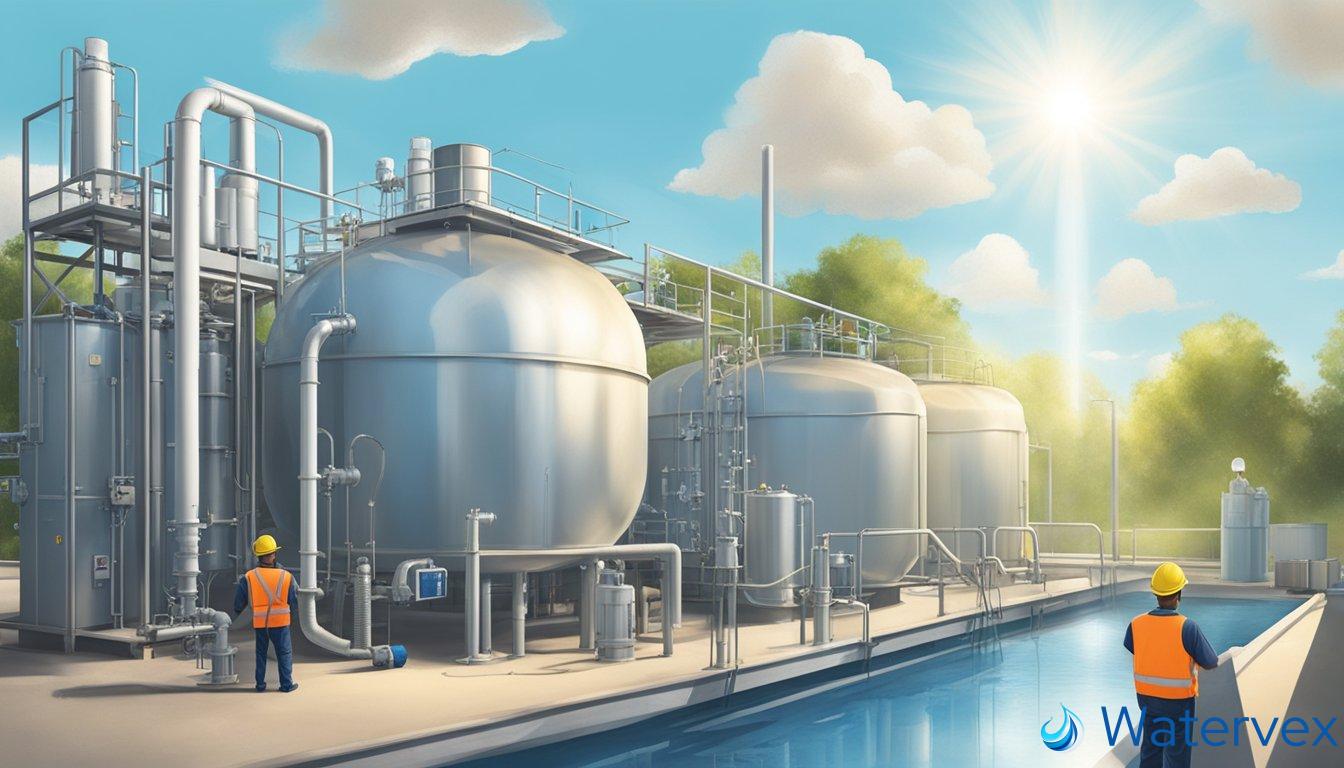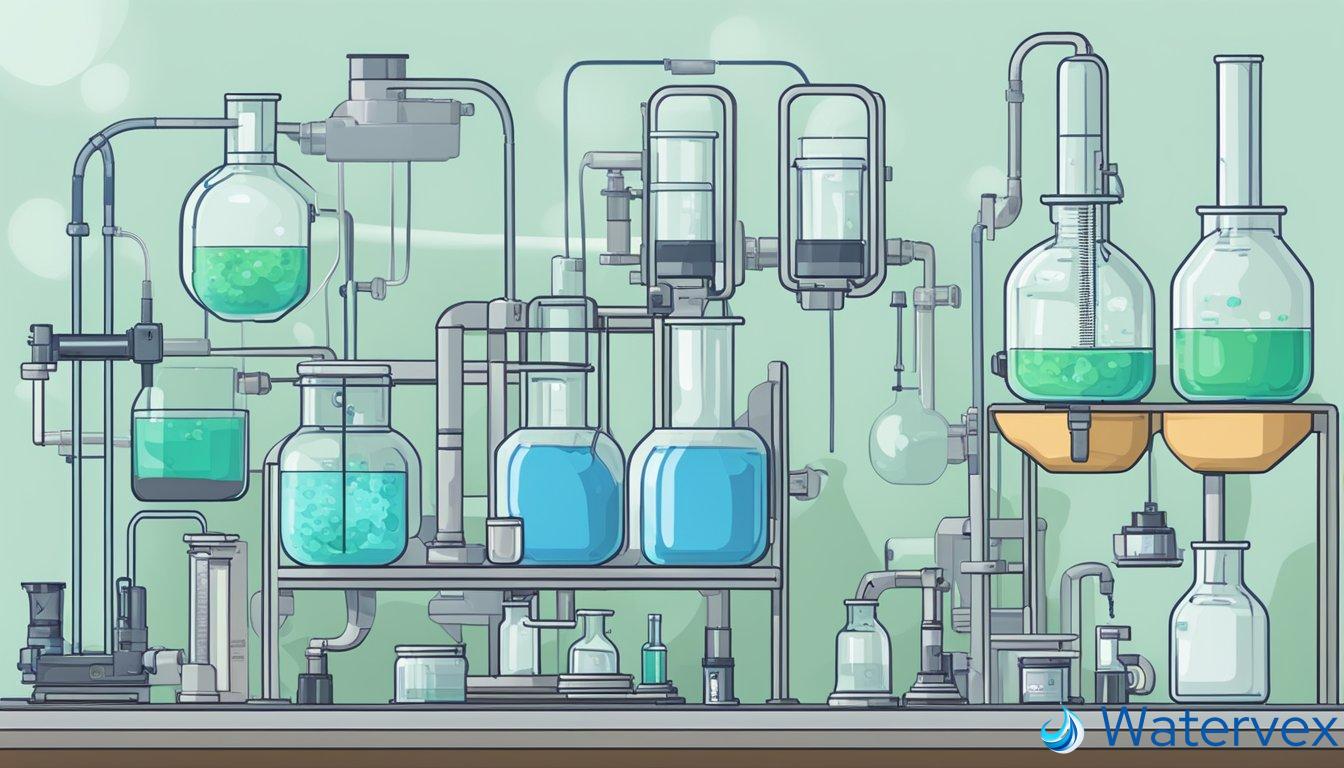Ozone water treatment harnesses the power of ozone, a form of oxygen with three atoms instead of the usual two. When incorporated into water treatment, ozone acts as a potent disinfectant, capable of neutralizing a broad spectrum of microorganisms, including viruses and bacteria. This method is preferred over some traditional treatments because it doesn’t leave behind harmful chemical residues.

Despite its powerful disinfection ability, utilizing ozone comes with trade-offs. The high reactivity of ozone that makes it an effective killer of pathogens also leads to concerns about the potential for creating harmful byproducts. Moreover, the systems required for ozone water treatment can be expensive to install and maintain. Evaluating these factors alongside the benefits is crucial when considering ozone for water purification in your home.
Key Takeaways
- Ozone is a powerful disinfectant for water treatment, effectively neutralizing various pathogens.
- Concerns exist regarding the potential formation of harmful byproducts from ozone treatment.
- The high efficiency of ozone must be balanced against the cost and maintenance of treatment systems.
What Are the Benefits of Ozone Water Treatment?
Ozone water treatment harnesses the power of ozone gas to purify and sanitize water, offering a compelling alternative to conventional methods. This advanced process brings several specific advantages which we’ll explore in detail.
Efficacy Against Microorganisms
Ozone is a powerful oxidant, more effective than chlorine in neutralizing bacteria, viruses, and other pathogens. It’s capable of destroying even the most resilient microorganisms that traditional disinfectants might miss.
Oxidation and Purification
The oxidative properties of ozone not only eliminate harmful organisms but also break down chemicals, metals like iron and manganese, and oxidize other impurities. This renders substances that could have adverse effects on your health harmless.
Taste and Odor Improvement
By neutralizing contaminants, ozone treatment effectively removes bad tastes and odors from water. You’ll be able to enjoy water with significantly improved quality right from your tap, without the undesirable flavor or smell.
Water Treatment Efficiency
Ozone water treatment systems are known for their efficiency. The process is fast, often requiring less contact time than chemical methods, and supports energy savings in both commercial and industrial settings.
Environmental Considerations
Opting for ozone treatment is a green choice. It produces fewer by-products compared to traditional chlorine-based systems, contributing to a safer and more environment-friendly approach to water disinfection.
Ozone Generator Technology
Ozone is produced on-site using ozone generators. Technologies such as corona discharge, which generate ozone by splitting oxygen molecules with electrons, present a safe and effective means of creating ozone for water treatment.
What Are the Drawbacks of Using Ozone in Water Purification?

While ozone is a powerful disinfectant for water treatment, there are several drawbacks to its use that should be considered.
Potential Health Hazards
High concentrations of ozone, though rare, can pose health risks if not managed properly. Prolonged exposure to ozone can lead to respiratory issues, and certain by-products, like bromate, are recognized as carcinogens. This can particularly concern you if your household includes vulnerable individuals or those with respiratory conditions.
Economic Factors
The use of ozone in water purification can be relatively expensive due to the cost of the ozone generation equipment and the energy required to produce it. Additionally, the maintenance associated with this system might increase overall costs, potentially making it a significant investment for your home.
Technical Challenges and Limitations
One challenge is the correct management of ozone levels, since solubility and activity need careful control. The optimal pH range and temperature must be maintained; otherwise, ozone’s effectiveness could decrease. Moreover, copper and stainless steel components can be prone to corrosion, requiring further maintenance.
Comparison to Other Disinfectants
Compared to chlorination, a common alternative, ozone does not leave a residual disinfectant to inhibit regrowth of microorganisms. This means that ozone-treated water needs additional safeguards against contamination. Furthermore, water treated with chlorine is less likely to react with common plumbing materials, reducing the risk of corrosion.
How Does Ozone Treatment Compare to Other Water Conditioning Methods?

When you’re considering how to treat your water, understanding the differences between ozone treatment and other methods can have notable impacts on the safety, taste, and longevity of your water system.
Comparison with Chlorination
Ozone water treatment is a formidable alternative to chlorination. Unlike chlorine, ozone doesn’t introduce toxic chemicals into your water. Ozone efficiently tackles bacteria and viruses without leaving behind harmful byproducts–a significant advantage since chlorine can form tri-halomethanes and haloacetic acids when interacting with natural organic matter in water. However, ozone is a more complex system requiring careful monitoring, while chlorine systems are better understood and more straightforward for widespread wastewater treatment.
Comparison with Filtration Systems
Against filtration systems such as activated carbon filters and reverse osmosis, ozone treatment is more about water disinfection than the removal of dissolved solids. Filtration works by physically trapping contaminants, while ozone disinfection involves a chemical reaction that neutralizes microorganisms. It’s worth noting, however, that ozone can enhance the performance of filters by breaking down certain substances that might otherwise clog filter systems, extending the life of your appliance.
Comparison with Ultraviolet Disinfection
Ultraviolet disinfection uses UV light to inactivate pathogens without chemicals, which makes it a clean process with no byproducts. However, UV systems require clear water to function effectively, as any turbidity can shield organisms from the lethal radiation. In contrast, ozone gas can permeate throughout the water, reaching even opaque areas. Nevertheless, UV systems are less complex and often more cost-effective for you, particularly in home use cases, compared to the more elaborate ozone generators necessary for complete water treatment.

